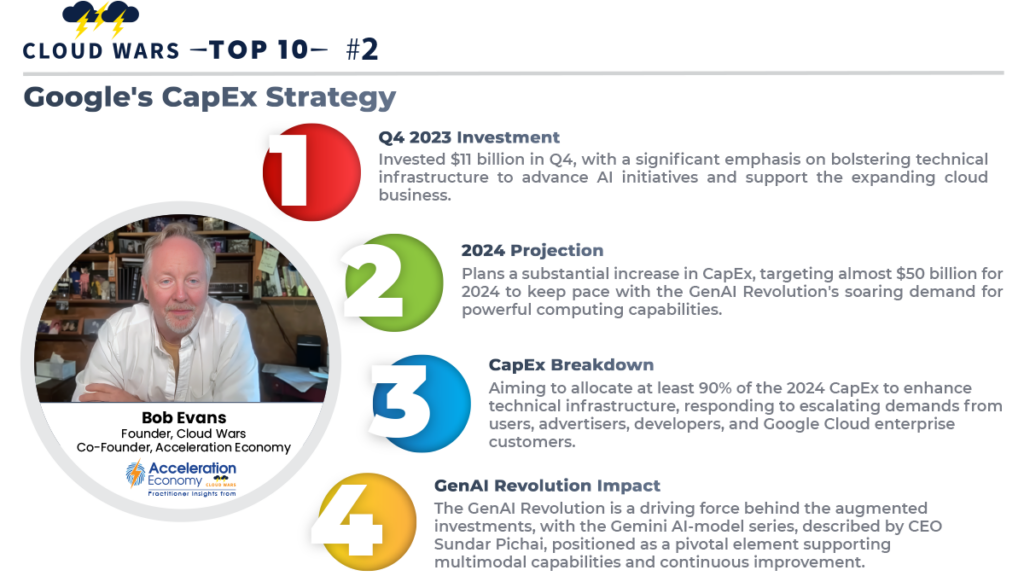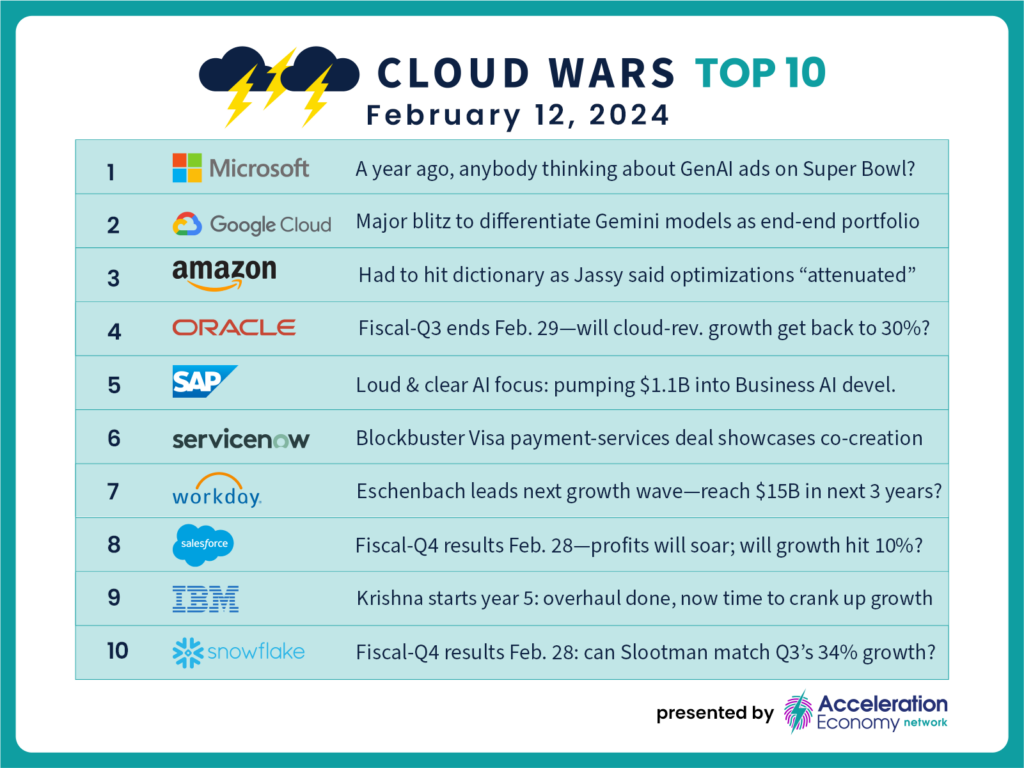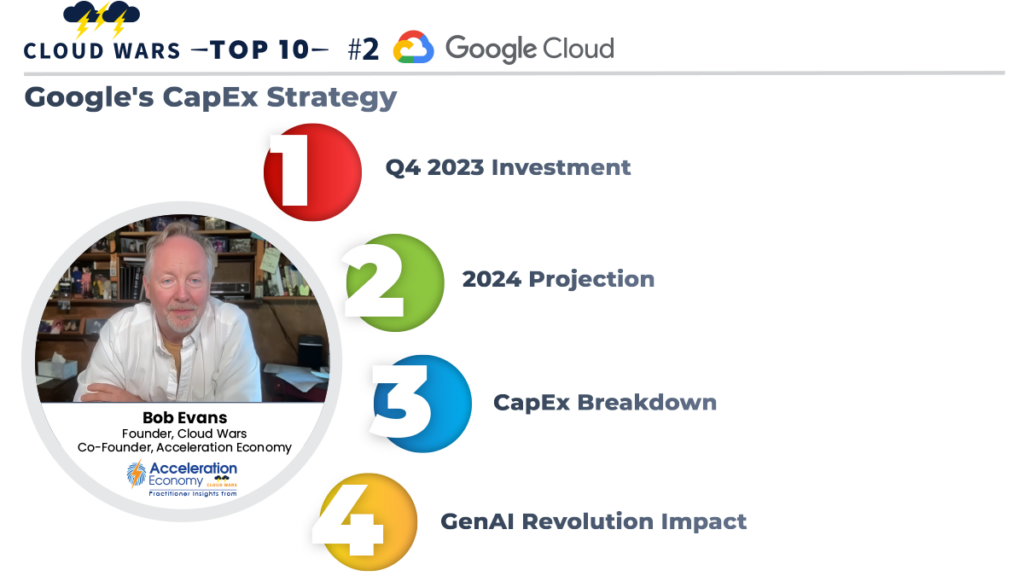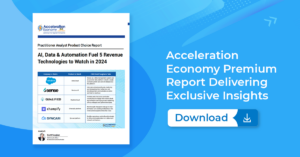
After pouring almost $11 billion into Q4 CapEx to fund technical infrastructure to support its booming AI initiatives and cloud business, Google expects to crank that up to almost $50 billion in 2024 as the GenAI Revolution creates enormous demand for computing capabilities more powerful than anything the world’s ever seen.
On Alphabet’s Q4 earnings call late last month, Alphabet CFO Ruth Porat cited that $11-billion figure for Q4 CapEx and said it was “overwhelmingly investments in our technical infrastructure” powering the “extraordinary applications of AI within Google DeepMind, Google Services, and Google Cloud.”
But it turns out that $11 billion per quarter isn’t enough to meet the customer demand that Alphabet and Google have been experiencing. As a result, 2024 spending on CapEx — with at least 90% of that being focused on technical infrastructure — is going to be “notably larger” than it was last year, Porat said.
“Last quarter, we noted that CapEx would continue to grow in 2024, and we do expect 2024 full-year CapEx to be notably larger than 2023,” Porat said, emphasizing that “the main point is we are continuing to invest” to meet surging demand from users, advertisers, developers, Google Cloud enterprise customers, and governments.
Now while I’m not a CFO, let me try to run some numbers to show how I came up with that $50-billion figure in the headline and opening sentence:
- in Q4, Alphabet spent $11 billion on CapEx, “overwhelmingly” on tech infrastructure;
- if we spread that rate of spending across a full year, that’s $44 billion on an annual basis; but
- Porat said spending throughout 2024 will be “notably larger” than in 2023, so I think it’s safe to assume that “notably” could equate to a 10% increase, which would push Alphabet’s investments in technical infrastructure and some other CapEx spending to almost $50 billion.
And I have to add that in light of (a) the surging growth of Google Cloud, with revenue up 25.7% in Q4 to $9.2 billion, and (b) the company’s immense investments in and expectations for its new Gemini AI-model series, my rough guess of a 10% boost might be far too modest.

After all, late last week Alphabet CEO Sundar Pichai described Gemini as “evolving to be more than just the models. It supports an entire ecosystem — from the products that billions of people use every day, to the APIs and platforms helping developers and businesses innovate.” On top of that, on the Q4 earnings call late last month, Pichai focused almost all of his extensive opening remarks on the sweeping and end-to-end efforts that Alphabet and Google are making around AI.
So if Porat’s comment about “notably larger” CapEx spending in 2024 means a 12% increase instead of the 10% boost I posed above, then that translates into $50 billion in CapEx spending for the year, with almost all of that going to technical infrastructure.
In fact, just based on the effusive description of Gemini offered on the earnings call by Pichai, that 12% boost might also be too timid. Here’s how Pichai outlined Gemini on the call:
“We closed the year by launching the Gemini era, a new industry-leading series of models that will fuel the next generation of advances. Gemini is the first realization of the vision we had when we formed Google DeepMind, bringing together our two world-class research teams. It’s engineered to understand and combine text, images, audio, video, and code in a natively multimodal way, and it can run on everything from mobile devices to data centers. Gemini gives us a great foundation. It’s already demonstrating state-of-the-art capabilities, and it’s only going to get better. Gemini Ultra is coming soon. The team is already working on the next versions and bringing it to our products.”
Final Thought
Even before the GenAI Revolution hit full swing, the four hyperscalers — Microsoft, Google Cloud, Amazon Web Services, and Oracle — were each pumping massive investments into data-center and other infrastructure to support their booming cloud businesses. And now, with the enormous demands for GenAI services among businesses in every industry and across every region of the globe, those investments are only going to go up — and quickly.
After all, GenAI represents a once-in-a-generation opportunity to rewire how the world operates —and for the coming year, we can expect Google to be pumping about $50 billion into the underlying tech-infrastructure side of the business to capture a big chunk of that unprecedented opportunity.











